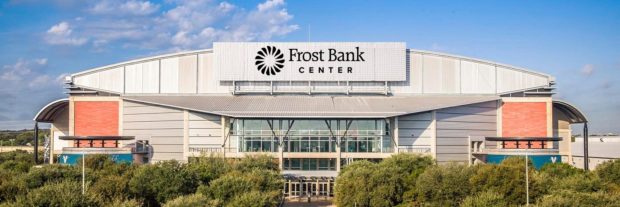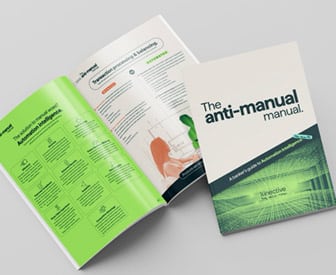Fifty years ago, the Dallas Chaparrals of the American Basketball Association turned to a San Antonio-based bank — Frost Bank — for the funding to make what would ultimately be a successful fresh start in the Alamo City.
“They were looking to move, and Frost fronted the money to come,” says Bill Day, Frost senior vice president and corporate communication manager. “So, we were supporters of the Spurs before they even became the Spurs. And we’ve been the Spurs’ bank ever since then.”
That 50-year history between two San Antonio institutions — the National Basketball Association team that has won five titles and the third-largest Texas-based bank, launched in 1868 — got even more intertwined in August 2023 when Frost announced a naming rights partnership changing the name of the Spurs’ arena to Frost Bank Center.
The agreement further solidified the Frost name for San Antonians, who now see the bank logo embedded in their downtown skyline.
Though Frost wouldn’t disclose terms of the deal beyond it being a “multi-year deal,” Sportico reported in August that Frost was paying about $9 million a year, “according to a source with extensive experience negotiating naming rights deals.” Sports Business Journal added in its report, “A source said the value of the deal is ‘a lot of money’ and that the bank ‘really stepped up, big time.'”
Granted, it’s not quite the $700 million that Crypto.com reportedly paid in November 2021 for 20-year naming rights to the downtown Los Angeles arena shared by the NBA’s two L.A.-based teams, the Lakers and Clippers, but it does fit within the range of values, from $1.38 million to $30 million, that Statista provided in 2020 for a number of other NBA franchises.

Community Bankers’ Top Priorities This Year
CSI surveyed community bankers nationwide to learn their investments and goals. Read the interactive research report for the trends and strategies for success in 2024.

The Financial Brand Forum Kicks Off May 20th
Explore the big ideas, new innovations and latest trends reshaping banking at The Financial Brand Forum. Will you be there? Don't get left behind.
Read More about The Financial Brand Forum Kicks Off May 20th
Why the Spurs Sponsorship was a Slamdunk
The newly-christened Frost Bank Center solidifies Frost’s name among fans of the team. Yet Day notes there’s a more comprehensive strategy behind it.
“One thing banks don’t do is spend money frivolously,” Day emphasizes. “We would not have done this sponsorship just to be nice to the Spurs. We really want some exposure on this. Yes, we’re only in Texas, but keep in mind that Texas has three NBA teams,” referencing the Dallas Mavericks and Houston Rockets, the Spurs’ chief rivals.
“We’re going to get a lot of exposure in those markets as well when those teams play in San Antonio,” Day continues. “We have big expansion projects underway in the Houston area and in the Dallas area. It will triple the number of locations that we have there.” Frost is the primary subsidiary of Cullen/Frost Bankers, Inc., a holding company formed in 1977 in a merger with Houston’s Cullen Bank in 1977.
Frost now ranks among the top 50 U.S. banks by assets: As of its most recent quarterly earnings report on Sept. 30, 2023, the New York Stock Exchange-traded company reported $48.7 billion in assets, providing “a wide range of banking, investments and insurance services to businesses and individuals across Texas in the Austin, Corpus Christi, Dallas, Fort Worth, Houston, Permian Basin, Rio Grande Valley and San Antonio regions.”
The words “across Texas” are particularly notable — Frost presents itself as a Texas bank and has gotten a lot of marketing mileage out of its focus on the Lone Star State. That positioning has extended to niche marketing campaigns, as in 2004, when Frost commissioned photographer Robb Kendrick to traverse miles and miles of Texas to create tintypes of real working Texas cowboys. The resulting Frost-sponsored art exhibit, which toured museums across the state, was named “Revealing Character” — nodding to the inherent character of the mythical cowboy but also underscoring Frost’s messaging about the type of bank it aimed to be.
Day notes, “We want to be the bank for everyone in Texas. We believe everybody deserves a bank like Frost,” pointing to its customer service awards and its reputation for friendly banking, as well as its deep knowledge of a state with a business-friendly climate. In 2023, Frost was the highest ranked retail bank in Texas in the J.D. Power 2023 U.S. Retail Banking Satisfaction Survey.
“The key to success in Texas boils down to building strong relationships,” says Brian Heflin, president of Dallas-based PlainsCapital Bank, regarding banking in the Lone Star State. “As a Texas-headquartered bank, PlainsCapital Bank has always put relationship banking at the core of everything we do. We take the time to get to know our customers and truly understand their unique needs, challenges, and opportunities. Then we go the extra mile to provide a level of service that’s often hard to find these days.”
In Texas, There’s Room to Grow
Frost is satisfied to concentrate on Texas in part because there’s lots of money in Texas.
“If you look at the deposit market in Houston, or the deposit market in Dallas,” Day notes, “each of those by themselves is bigger than the deposit market in Arizona or the deposit market in Colorado. So again, there’s plenty of room to grow here,” characterizing the current Frost market share as “tiny but growing,” and noting they’re positioned to compete with both the national “banks too big to fail” and with regional banks like Comerica and Texas Capital Bank that operate in Texas’s major metro areas.
In November, Frost opened its 180th branch in Grand Prairie, a city within the Dallas-Fort Worth Metroplex. In its release about the opening, Frost made clear that the branch opening was part of a greater expansion in the Dallas region and that “Frost is expanding into new locations while many other banks are scaling back their branches.”
“Eventually, we expect mortgage lending by itself to be about the same sized as the rest of our consumer loan portfolio.”
— Bill Day, Frost Bank
And earlier this year, Frost returned to offering home mortgages, a product which once made up nearly an eighth of its loan portfolio in the late 1990s, but hadn’t been offered to customers since 2000.
Day says, of the decision to jump back in, “Thousands of people are moving to Texas every day and they need houses; a lot of what has slowed in mortgage lending is refinancing, and that isn’t Frost’s focus.”
Frost Mortgage options include Frost Progress Mortgage, a product designed specifically for low- and moderate-income borrowers.
“We’re content to go slow,” Day says of the rollout, noting that they’re opting for communication with area realtors over a big marketing campaign. “It’s more important to us to grow the right way than it is to hit specific numbers. Eventually, we expect mortgage lending by itself to be about the same sized as the rest of our consumer loan portfolio.”
The Frost Bank Center announcement places the bank’s name on an arena that holds 19,000 for concerts and a slightly smaller audience for 41 Spurs home games a season — plus playoffs, should the recently-moribund team return to those ranks. The agreement with Spurs Sports & Entertainment was subject to NBA approval before going official for the 2023-24 season newly underway.
Though the arena is used for other events — including the annual San Antonio Stock Show & Rodeo, covering the arena’s floor with dirt for two weeks and sending the basketball team on what’s colloquially known as the “rodeo road trip” — the naming rights agreement is with the basketball ownership group, with other events attached to Frost Bank Center being ancillary.
Read more:
- From Johnny Cash to FIFA, Renasant Maximizes Its Sponsorship
- How Stadium Branding Can Be a Winning Strategy
It’s Not Frost Bank’s First Day in the Yard
But it’s not the first example of Frost using its name and logo to advance its brand strategically.
Before Frost lent its name to the Spurs’ arena, it purchased real estate on the Spurs jersey in 2018, a year after the NBA began allowing corporate jerseys on logos.
In 2003, Frost became a tenant in, and then assumed the naming rights for, a downtown Austin skyscraper under construction known as Frost Bank Tower. Even 20 years after completion, it’s distinctive enough in the present-day Austin skyline to have been included on the set of the long-running PBS show Austin City Limits, featuring noteworthy musical acts playing live concerts; it’s a show that helps Austin make the claim, per an official city slogan, of being Live Music Capital of the World.
Part of the appeal of banks naming sports arenas might be the strong emotions that come with being a fan of a team — especially in San Antonio, where the Spurs remain the city’s only pro sports franchise among the top five North American leagues.
In the naming announcement, Frost Chairman and CEO Phil Green pointed to both organizations’ local ties and core beliefs, saying, “We believe in San Antonio – it’s our hometown. We want this relationship with the Spurs to demonstrate our unwavering sense of pride for San Antonio’s rich history and its bright future. The longevity and success of both the Spurs and Frost Bank are rooted in our shared values of integrity, caring and excellence. These values ultimately help strengthen and shape our entire community.”
Dig deeper: How 5 Differentiated Bank Brands Work to Stand Out
While the Spurs are certainly beloved in San Antonio and surrounding cities, they’ve also inspired some league-wide intrigue this season because of 19-year-old French rookie phenom Victor Wembenyama, drafted by the Spurs in June and regarded as a generational talent whose ceiling is on par with legends like Michael Jordan and LeBron James.
Phil West is a veteran professional writer and editor, and the author of two books on soccer, ‘The United States of Soccer,’ and ‘I Believe That We Will Win,’ both from The Overlook Press. His work has appeared most recently in The Striker (where he served as managing editor), MLSSoccer.com, Next City, and Texas Highways. Based in Austin, he is also a lecturer in the Writing Program at the University of Texas at San Antonio.








